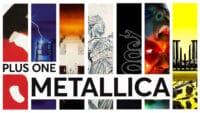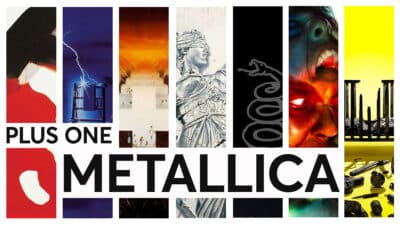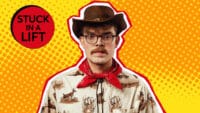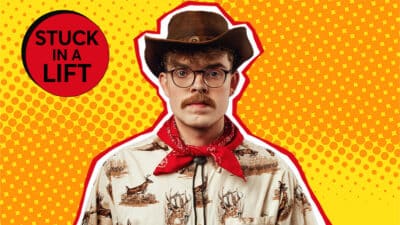Interview
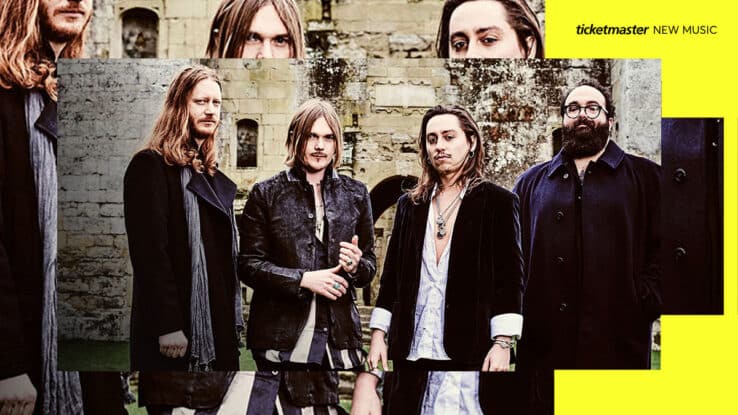
Interview
MIRADOR: “You can’t know how far ‘too far’ is unless you’ve gone there”
Greta Van Fleet's Jake Kiszka and Ida Mae’s Chris Turpin talk pushing limits with their new rock project
Born of late-night wine-fuelled jam sessions whilst Kiszka and Turpin were on the road, MIRADOR is a place where the past, present, and future of rock ‘n’ roll collide.
Tracing the genre’s lineage with the assistance of bassist Nick Pini and drummer Mikey Sorbello, their arrival came in the form of a self-titled debut album earlier this year. Cut live with producer Dave Cobb, its twelve songs draw on the sounds of old songbooks, haunted field recordings, British folk revivalists, and the vast landscape of modern rock. The product of two kindred creative spirits and their shared obsession with rock’s evolution, it’s a love letter to the genre, embracing tradition and reinvention in equal measure.
Creating a mythical universe of their own that demands to be lived inside, after a run of arena shows opening up for Greta Van Fleet in the US, MIRADOR are bringing their expansive project to the UK this November. Ahead of the shows, Kizka and Turpin talk us through the duality of their collaboration and the volatile process of capturing the lightning on their debut full-length.
Let’s take it back to the beginning. When did jamming together progress into conversations around forming a fully-fledged band?
Jake Kiszka: It wasn’t decided at a responsible hour, that’s for sure! There’s quite a lineage to Chris and I’s friendship and our musical journey. It starts back when Ida Mae were opening up for Greta Van Fleet in 2019, and goes back to my impression of Chris’s guitar playing, singing and songwriting.
That would have been six years ago now, and there’s been an evolution. Chris and his wife were living in America when COVID had happened, and the entire music industry came to a halt. There was this frenetic scene going on in Nashville at the time, and Chris and I bumped into each other again. Chris had been working on a record, Click Click Domino, with Ida Mae, and he invited me to play on it. I did, and there was this musical chemistry between us. I’ve really only had that chemistry with my brothers before. It was instantly apparent that we were coming from a similar place, and that there was a lineage we shared. Influentially speaking, the things we listened to, the things we grew up with – even in the way that we were raised.
After that, I asked Chris to come over and stay in my house in East Nashville. It’s an old Victorian house, and the idea was that we’d spend a couple days writing with no objectives or goals. We were just writing for fun; probably as an excuse to drink wine and stay up until three in the morning. By the end of day one we’d written two songs, so we said, ‘Okay, let’s try this again tomorrow.’ On day two, we’d probably written three songs, and so on. Over the course of four days, we had a substantial amount of material. At that point, I was looking at Chris going, ‘Would you be interested in doing something a bit more formalised with this? Would you be interested in putting something together?’ That’s when it happened.
When it came to making the record, what was the vision? Was there a specific mood or manifesto guiding you?
Chris Turpin: These songs were forged and written in such intensity. Jake and I had never written with another partner where things had happened so ferociously and vividly. It was a shock to both of us. When it came to approaching the record, the main thought was that we needed to capture the energy of the process. We were in a position to curate a rock ‘n’ roll record with a sense of excitement that each of our respective bands couldn’t do on their own.
In terms of the recording process, we knew we wanted to keep it very live. We had certain notation points we wanted to hit. It needed to have a sense of a classic record, but it had to have this modern edge. Thinking back, it was ridiculous. We were pulling from ancient folk songs, looking at the lyrics of ballads and listening to these strange waltzes. We took things you wouldn’t expect to have on a rock ‘n’ roll record and tried to re-contextualise what that felt and sounded like for a more modern audience. We were holding our breath and hoping people understood what we were trying to do.
Kiszka: Chris and I quickly had an understanding, philosophically, of what MIRADOR is. That’s probably a greater part of why we believed this was essential for us to pursue. MIRADOR wasn’t two guitar players getting together to write a bunch of riffs, it was more elaborate. Along with all the music we were sharing, there was also a lot of literature, film, and philosophy. The culmination of this stuff gave MIRADOR a bit more of a mythology, a world or a context to play in.
Once we understood that, it came down to how we would approach the record. Chris has produced records, and I produce records. Initially, we thought maybe we should just produce it together. That changed when Nick and Mikey came into the picture. If we were going to have a full band, it would be difficult for Chris and I to play guitar, sing, write, and record all at once whilst also playing a producer role. We needed an external perspective, someone who could look over this and bring insight you only get from the outside.
Names were thrown around, but we ultimately landed on Dave Cobb based on the material we had. It was ambitious, and it was going to be cut live. There was a hedonism and a barbarity to it, so we needed someone who could capture that lightning. There are very few people left who can actually record a rock ‘n’ roll record. Having worked with Dave in the past, I knew the chemistry would work, and it did.
The album feels built to be experienced as a whole. Still, you have to lead with a single – why did ‘Feels Like Gold’ seem like the right choice to introduce this project to the world?
Turpin: In building this strange mythology and soundscape that MIRADOR has begun to inhabit, it was a very natural flow. For whatever reason, we are 99% of the time on the same page with whatever it is we’re looking at. I don’t typically care about singles though. We wrote the record on acoustic guitars – two parlor guitars – so it was centred on melody and lyrics. We built out the guitar parts after, and we had these ungodly, intricate acoustic guitar parts for ever song. Maybe they’ll see the light of day at some point.
‘Feels Like Gold’ is interesting because we decided we needed some sort of battle charge, some big heaving riff moment – which Jake is somewhat adept at. When the band got together, it was very late. We did some demos at Real World Studios in the UK, and that was where the whole band first got together. Some of what was tracked in those sessions made the record, and ‘Feels Like Gold’ came together late one night. It had an energy we couldn’t have controlled or made up. There was something in that title that laid out a lot of what we’d done in our separate careers, but it felt different. It had a swagger and a movement that felt important and flag-bearing, so it felt appropriate to lead the charge.
There’s a striking duality throughout the record, especially with those ideas of light/dark and tradition/reinvention. Was that intentional or something that revealed itself during the process?
Kiszka: Very much intentional. There was so much premeditation behind the idea of contrast. Within the essence of the music, the songwriting, the recording… There’s always duality: light and shade, beauty and savagery. We wanted to create a very dynamic record.
On tradition and reinvention, we looked through the scope of rock ‘n’ roll. A lot of musicians in rock have this tunnel vision looking forward into the future. They’re always thinking, ‘Where’s the future of rock ‘n’ roll going to be?’ Our approach was to look backwards as far as we possibly could. People who know my history or Chris’s know we’ve been notable for studying ancient blues and roots music, world music and folk. On this record, we intentionally went even further back into the field recordings of Alan Lomax, the ancient hills of Poland and Eastern Europe, the Golden Coast of Africa, Sufi music, Southeast Asia, and Native American music. We were constantly thinking about how much further we could go back, and how much we could find that even exists outside of oral history. We really did our homework. Turning the pages of time lent itself to reinvention, and it clarified our pathway forward. It felt like an original approach and gave us a sense of authenticity.
Turpin: I’m from Norfolk, and we were pulling up ancient mariner singers from there. We were picking through old ballad books that I was buying from all sorts of places, dredging through lyrics that had survived for thousands of years. By pulling from all of these things and putting them into a rock ‘n’ roll band, you immediately create contrast that’s rarely done. Everyone pulls from everything to some extent, but it was a primary focus to pull some of that back from the aeons of time.
It goes a long way towards creating the world around the record, and MIRADOR invites listeners to dig deeper. You have the option to enjoy the songs at face value, but there’s also that encouragement to delve in and uncover more about the history within them…
Turpin: That was precisely the idea. We live in such an age of cognitive dissonance. There’s so much noise, and everything is song-based and gets five minutes in the sun. I’m just not interested in making that. What I’ve found inspiring working with Jake is there’s always a sense of looking into the distance. Built into this record is a sense of legacy, time, and being a piece of something larger than yourself. It’s also about being unimportant to some degree in that, adding to the river of things that have already been made. It sounds pompous and over the top, but it’s true. In pulling from these sources, it was partly to offer something with more meaning. If you want to dive into it and exist in the record, then you’re able to.
Kiszka: I think within MIRADOR’s overall philosophy there’s an element of: you can’t know how far ‘too far’ is unless you’ve gone there. We gave ourselves all the permission we needed to go into these territories and explore these spaces. We found limitations, and we also found a lot of invention within that context of working.
You’re in somewhat of a unique position, because whilst MIRADOR is just beginning, you’ve both already ticked off countless bucket list moments throughout your own careers. With the debut album out and your first UK shows approaching, what’s it like to be back at the start again?
Kiszka: It goes both ways. There’s an aspect of struggle, hunger, and ambition that drives MIRADOR. If this wasn’t important to Chris and I, and the other guys, we wouldn’t be pursuing it. We’re in a place in all of our careers that it wasn’t essential to do something else, so the fact that we felt as though we had to means there’s a certain essence of necessity driving us. There’s beauty in being at that beginning place again, but there are also rings of fire associated with it. There are so many hoops to jump through, any of which can snag you and light you ablaze. Persistence and duality manifest destiny, and with MIRADOR that’s the beauty of it. It had to happen, and there’s an element of fate. We’re all there for it. It’s refreshing as well as monumental.
Turpin: I’ve lived a much more indie existence than Jake. I don’t typically have 10-metre flames going off behind me as I’m doing guitar solos! It’s been extraordinary coming into these clubs and theatres to play for 500 to 1,000 people though. We’re able to give them such an intense show. The fans that have followed the breadcrumb trail we’ve laid out for MIRADOR have entered into something that’s elevated our performance. It’s showed us something beyond the black boxes we’ve been working out of. It feels deeply at home, kind of spiritual and exciting. As much as it’s been a grind, it’s worth it. We didn’t have a choice, I don’t think.
Kiszka: I agree with Chris. There is an intimacy I’m particularly fond of. At some point, in the big rooms, people dissipate into a black space. One of the big positives here is being able to connect with people directly and see their faces. That’s been really reinvigorating for me personally.
MIRADOR start their 2025 UK tour on 9 November. Find tickets here





